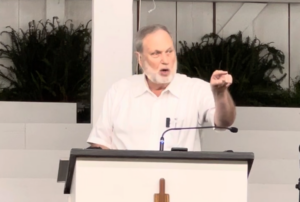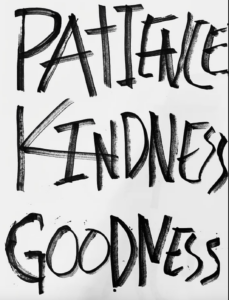Solomon didn’t sugar-coat human existence. Often called “the wisest man who ever lived,” Solomon wrestled with the meaning of life. In his diary of that wrestling (the Book of Ecclesiastes), he begins with that seems to be the case — that life seems meaningless. People work; they have kids. The wind blows; rivers run into the sea. All this movement … for what? Because we can be rich, smart, fixed for life, with every move perfectly calibrated, and still be miserable. We can be incredibly busy and organized and put miles on our pedometers and odometers and still go nowhere.
After examining all the options, Solomon came to this conclusion: Life cannot be its own good. The circumstances of it don’t generate the kind of fulfillment for which humanity longs. There has to be more to life than simply living it. Solomon’s wrestling offers alternatives to the drudgery of simply existing so we can live as we are designed.
Here are ten suggestions from a very wise man:
1. A positive approach is half the battle.
The starting point for finding meaning in a seemingly dead-end existence is to change our perspective. A simple decision to see life as hopeful is a good first step toward wisdom. The smart ones are not the ones who can criticize everything; they are the ones who can see through to creative solutions. In our current culture, it is no small thing to choose positivity over criticism.
2. Evaluate your values.
Our church has set three simple values for ourselves to help us decide what to say yes to and what to say no to. Those three values have changed us. They took away all the hesitation and need to please. Instead, we are now more focused, more determined, and our decisions have more integrity. Take time to figure out what matters to you, so you can begin to make choices based on values rather than the moment.
3. Timing is everything (but not everything is up to us).
Singing the words of Ecclesiastes 3, The Byrds informed a generation that there is a time for everything. There will be times when we must restore something that looks for all the world like dead, and also times when we have to tear everything up that we thought we cared about in order to be on the side of right. Knowing which time is which is the real trick and if it were all up to our always getting it exactly right, we’d be sunk. Timing is everything, but God’s sovereignty is able to work God’s design into our choices. Are you being stepping up when the time is right, trusting God to place the floor beneath your feet?
4. Embrace the power of partnerships.
In his book, Bowling Alone, Steve Robert Putnam theorizes that since the 1960s our nation has dramatically decreased its ability to foster friendships. Along with a decrease in social interaction has been an increase in panic attacks, paranoia and other fears; intolerance of noise; difficulty with concentration; and an increase in aggressive fantasies. Why? Because we have lost touch with the divine design. We threaten our own quality of life when we put self above others. Healthy partnerships are the cure. They require vulnerability, accountability and honesty. Pursue partnerships that honor God and add value to your life and work.
5. Learn to trust by becoming trustworthy.
God is not as committed to our happiness as he is to our character. Becoming trustworthy is what happens as we become holy. So how can we improve our trust factor? For starters, we can learn to listen first before we form opinions. The fact is, we probably know less than we think we do about any situation. Lean in and learn to trust others’ good intentions rather than assuming the worst in the absence of information.
6. Practice grace (it is the key to healthy relationships).
Grace is not for wimps. Solomon’s version of grace looks a lot like accountability (Ecclesiastes 7:5): “It is better to heed the rebuke of a wise person than to listen to the song of fools.” We need people who love us enough to speak the truth in love. Grace is not only unmerited forgiveness; it is that willingness to lean in and stick together, no matter what.
7. Pursue joy, and not just happiness.
If we’re waiting for all the clouds to break and for everything to become clear this side of death, we will be sorely disappointed. And anxious. What if, instead, we just decide to enjoy the rescue, instead of rebelling against it? What if, as Hugh Halter has so wonderfully counseled, we decide to “enjoy life, and live like a missionary”?
8. Live for the long haul (and not for the moment).
Soren Kierkegaard was a Christian philosopher in the 20th century. He once said that to make progress, we should define life backwards, then live it forwards. In other words, instead of just getting up every morning and putting one foot in front of the other, hoping that it all leads someplace, we should start with a goal, then work back from there. What do you value? What do you want to accomplish? Start there, then plan backwards toward your present.
9. Weigh your words.
Somehow, we’ve managed to create an atmosphere where you can say just about anything and even get applause for it. In the right atmosphere and for the right reasons, transparency can be a marvelous freedom. Undisciplined opinionating, on the other hand, is the surest way to expose your own foolishness. In fact, I am now convinced that discipline is not only the key to spiritual maturity and effective fruit-bearing, but also the root of all joy.
10. Fear God (it is the beginning of wisdom).
This is where Solomon concludes his quest for the meaning of life. He counsels his reader to learn how to fear God, not in the guilt-generating sense of thinking God is out to get us but in the humbling sense of recognizing there may be more to this than we can understand. It is the stark realization that in order to love this life, we have to love God more. And that in the process of loving God more than our own lives, we will find ultimate freedom, wisdom and joy.








